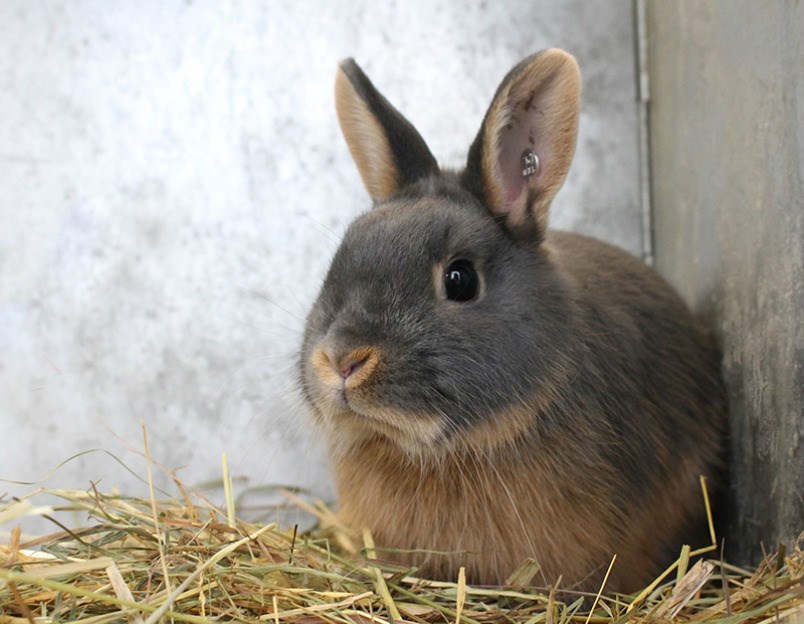There has been no sign of Rabbit Hemorrhagic disease at the Coquitlam Animal Shelter and all steps are being taken to protect the rabbits, including inoculation with a vaccine, according to staff. Photograph By PIXABAY.
 There has been no sign of Rabbit Hemorrhagic disease at the Coquitlam Animal Shelter and all steps are being taken to protect the rabbits, including inoculation with a vaccine, according to staff. Photograph By PIXABAY.COM
There has been no sign of Rabbit Hemorrhagic disease at the Coquitlam Animal Shelter and all steps are being taken to protect the rabbits, including inoculation with a vaccine, according to staff. Photograph By PIXABAY.COM
Fern, Charlotte, Hazel and Rabbit DeNiro are just a few of the rabbits at the Coquitlam Animal Shelter who will be inoculated with a vaccine this week to stop the spread of a deadly virus that is killing bunnies around the world.
Rabbit Hemorrhagic disease attacks a rabbit’s organs and blood vessels and was detected first on Vancouver Island and later in Delta and at the Richmond Animal Protection Society, where as many as 64 rabbits have to be euthanized after a number died from the disease.
The SPCA has ordered a series of protocols, including immediate quarantine of the so far healthy rabbits and animal shelter spokesperson Andrea McDonald said the vaccine (Filivac) that addresses RHDV2 will arrive this week.
“When we heard about it — it originated on the Island, we quarantined our rabbits, so no one goes in and out and so far we have not had any issues. We have ordered the vaccine that should be coming shortly, we have’t had any of our rabbits show any kind of symptom at all,” said McDonald, who is the cities manager of bylaws, licensing and animal services.
Meanwhile, the province has distributed vaccines to 50 B.C. veterinary clinics that have ordered it and to meet the demand, a second batch of the vaccine is expected in early May.
Meanwhile, staff at the Coquitlam Animal Shelter hope they have ensured their animals are protected.
McDonald credited the quick action of staff who began to take steps to protect the rabbits — including Hazel who has been at the centre for three years — as soon as they heard about the disease.
“We’re doing the best we can to ensure there’s no way we these rabbits can catch it and the sheltering community we really keep in touch with each other,” Andrea said, acknowledging that staff are upset to hear about what the Richmond shelter is going through.
“It’s devastating to hear that something like that has to happen.”
There are currently nine rabbits at the Coquitlam shelter and McDonald said they can be hard to adopt out while others who acquire them as pets when they are small often get rid of them when they get big because of their high needs.
Because there hadn’t been this kind of outbreak in Canada, the vaccine is being acquired under a special emergency authorization.
In Richmond, according to media reports, the vaccine arrived too late to save the animals and the vaccine will be donated to low income people with rabbits as pets.
IF YOU HAVE RABBITS
To date, tests on 27 feral and domestic rabbits have been completed, 20 were feral, seven were domestic. Only two of the seven domestic rabbits tested positive while 19 of the feral rabbits tested positive.
Rabbits that tested positive were received from Comox, Courtenay, Delta, Nanaimo, Parksville and Richmond. Rabbits that tested negative were from Abbotsford, Maple Ridge, Mission, Surrey, Nanaimo, Parksville and Victoria.
Pet owners should monitor their rabbits daily for signs of illness, and contact their veterinarian immediately with any concerns. The virus causes hemorrhages by affecting the blood vessels, and attacks the liver and other organs. Most affected rabbits die suddenly, but can show signs of listlessness, lack of co-ordination, behaviour changes or trouble breathing before death.
There is often bleeding from the nose at the time of death. Once infected, signs of illness occur quickly, usually within one to nine days.
The BC SPCA is not accepting rabbits for adoption and more information about the disease can be found here.
 There has been no sign of Rabbit Hemorrhagic disease at the Coquitlam Animal Shelter and all steps are being taken to protect the rabbits, including inoculation with a vaccine, according to staff. Photograph By PIXABAY.COM
There has been no sign of Rabbit Hemorrhagic disease at the Coquitlam Animal Shelter and all steps are being taken to protect the rabbits, including inoculation with a vaccine, according to staff. Photograph By PIXABAY.COM

